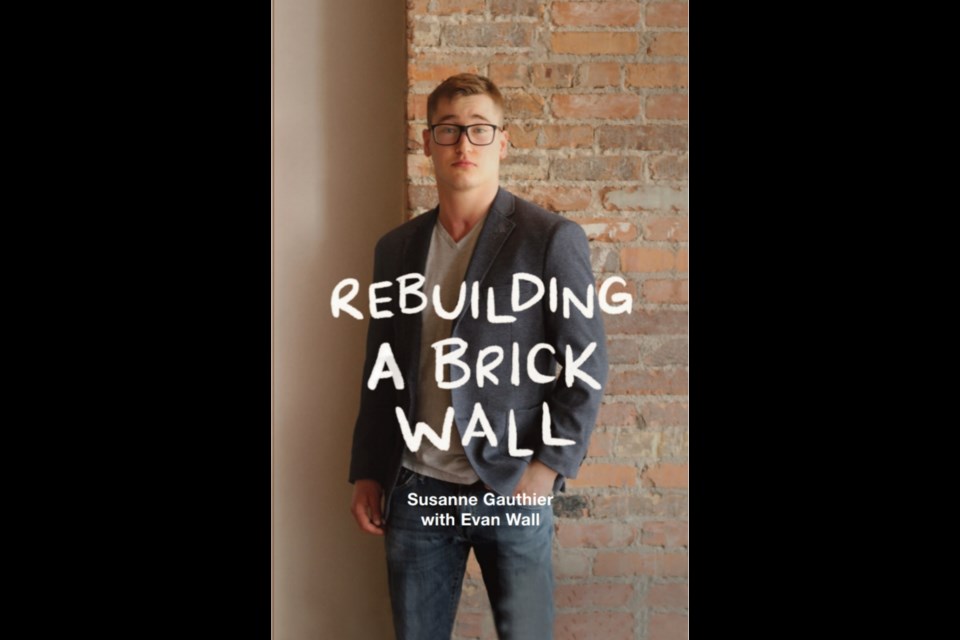SASKATCHEWAN — Evan Wall was 19 years old when he was in a car accident that left him disabled due to brain trauma – his remaking of himself is the subject of his new book Rebuilding a Brick Wall (2021).
Wall sustained a diffuse axonal brain injury (DAI) after the truck he was a passenger in flipped, throwing him from the vehicle. He wasn’t wearing his seatbelt. He was evacuated by a Shock Trauma Air Rescue Service (STARS) air ambulance to Saskatoon’s Royal University Hospital.
A DAI happens when a person hits their head so hard that nerve fibres tear throughout the brain. Many people who suffer severe a DAI never regain consciousness.
Wall’s survival was uncertain. He pulled through after spending two weeks unconscious. Neurologists couldn’t predict how much function he would have upon waking.
It was six months before he left the hospital.
He had to relearn almost everything, slowly and with great difficulty. Wall told Brain Injury Canada: “Ironically, the learning and adaptation going on inside my brain was more dynamic and demanding than a healthy adult would ever have to endure. I was working harder at learning basic life skills than I ever had before, in university or any other aspect of my life.”
He told MooseJawToday.com that it has been a major adjustment to be left physically disabled.
“A big part of my identity was being physically active. Not just sports and such, but being very physically capable.”
However, that isn’t the hardest part. Wall has spent a lot of time talking to journalists and other people since his book debuted, and he said that “One thing I was thinking about today is people always focus on the physical. And it seems that there’s not enough emphasis on the mental part of it.”
Wall said that the mental suffering he’s endured throughout the injury and rehabilitation is much more important than the injury itself. It is not something he is particularly eager to talk about in casual conversation, he clarified, but the isolation and loneliness of people with disabilities needs more attention.
He met his friend and co-author Susanne Gauthier at the gym, where he has taken up bodybuilding (which he loves).
“I just happened to see him there and talk to him and noticed he was a very personable, charming fellow,” Gauthier said. “But that he spoke differently and walked differently from regular people and I didn’t really know why. So I was curious about that, and I asked him about it.”
Gauthier is an experienced writer, although she has never written a full-length book before. Rebuilding a Brick Wall, told from Wall’s perspective, is a debut for both of them.
“I hope they learn how much a person can actually take,” Wall said about people who read his book. “You may think, ‘there’s no way,’ but once it’s your time, and you have no choice but to rise up to the challenge, you can be sure that your body and mind will find a way.”
Wall also hopes that his book inspires people to think about microaggressions and ableism – discrimination in favour of able-bodied people. Since his accident, he has noticed distinct differences in how he is treated.
“Sometimes I feel like you don’t get as much respect. And because you have a disability, certain people look down on you. Not treating you poorly, per se, but they think they’re above you. It’s kind of unspoken.”
Wall and Gauthier joined the BrainLove campaign taking place in March to help raise awareness of brain injuries.
BrainLove is a partnership between the Saskatchewan Brain Injury Association and the Saskatchewan Royal Purple Society that is emphasizing the importance of protecting your head and living a brain-healthy lifestyle.
Funds raised by the BrainLove campaign are used to support those living with brain injuries and to support education and prevention programs.
- Read more of Evan Wall’s story at
- Contribute to Brain Awareness Month at
- Rebuilding a Brick Wall (2021) is available and




